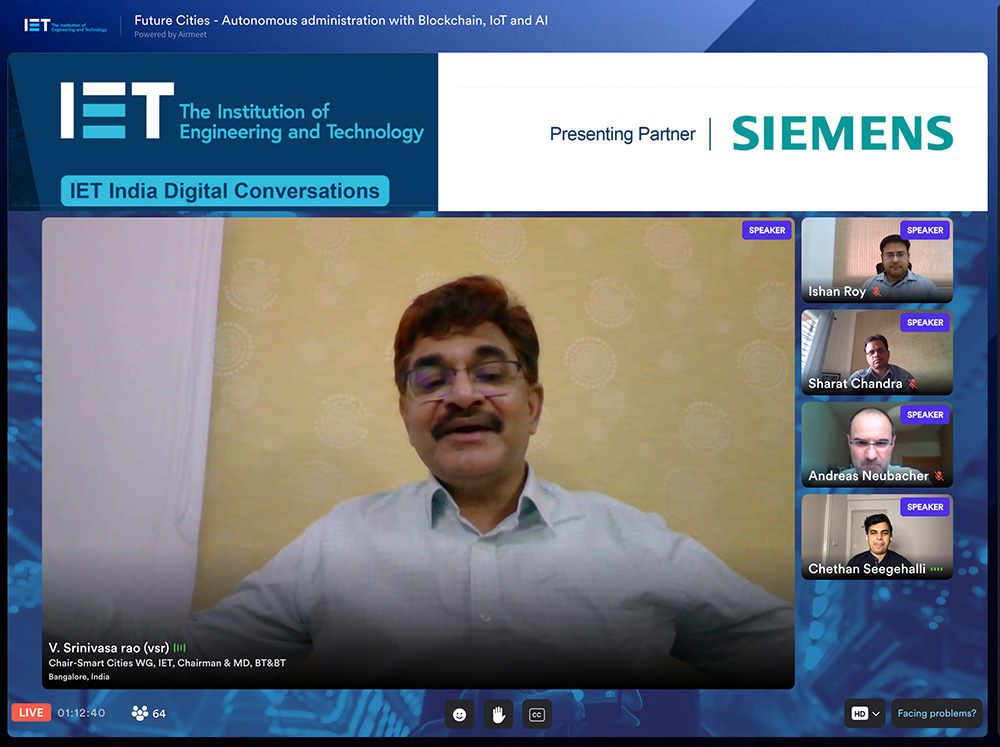Some of the top authorities in smart city technologies came together in a conference session on March 26 dedicated to Future Cities - Autonomous Administration with Blockchain, IoT and AI. The session was the 33rd episode of IET India Digital Conversations, in association with Siemens, ETSI and TSDSI.
The online session involved more than 200 attendees participating from organisations including ETSI, Alstom, RedHat, Maruti Suzuki, Suez Water, ABB, First American, ISRO among many others. In addition to top global technology firms, it also involved members representing Patna Smart City, Directorate of Urban Land Transport - Karnataka, GMR Airport and Tamil Nadu Smart Cities mission.
The online session involved more than 200 attendees participating from organisations including ETSI, Alstom, RedHat, Maruti Suzuki, Suez Water, ABB, First American, ISRO among many others. In addition to top global technology firms, it also involved members representing Patna Smart City, Directorate of Urban Land Transport - Karnataka, GMR Airport and Tamil Nadu Smart Cities mission.
Global Participation
In addition to attendees from across India, we were also joined by delegates from Qatar, UAE, Singapore, Sri Lanka, Austria, France and Belgium. It was truly a global gathering of minds, who all came together to discuss the future technologies that are helping shape how City Administrations manage their cities. InDiCo was happy to enable the participation of a representative of ETSI / oneM2M from Deutsche Telekom in this exchange of views and good practices.
Key Takeaways
Here are some of the key takeaways from this Digital Conversation:
- Governance has improved over the years, moving from eGovernment towards true Digital Governance - but we are yet to reach a level of technological maturity in most global cities. Autonomous governance is still a distant dream.
- Cities have many bigger problems to tackle today so when looking at the deployment of new solutions, it's important that Cities focus on the benefits to users before talking about technology. In the near future we will likely see semi-autonomous systems that will be a hybrid form of technological and human intervention.
- Blockchain might not be able to absolutely eliminate the existing challenges in healthcare but it can definitely be a tool and an enabler for smart healthcare for example or to facilitate the real time exchange of data.
- The move from electronic governance to true digital governance will require laying a foundation or a pavement that will consist of different tiles, such as standards, policies, and infrastructure etc. Some of these tiles are already in place but these need to be designed and laid-out in a modular way, so that different departments or even cities can easily embrace them. And this modular approach needs to be made accessible to the private sector.
Standardisation, such as oneM2M, is absolutely key in ensuring interoperability of the multiple solutions needed to operate city services. This standardisation goes far beyond API's compatibility. IOT is about linking of data from different sources. When designing a smart city administration of the future, the overall architecture needs to be first defined and then vendor independent core technology is very important, as cities need to maintain technologies over many years. If standards are developed, it allows for interfaces between different technologies from different vendors, using a common data model and common semantics across verticals. Standards need to oversee large chunks of the architecture, not just a protocol or an API. The standardisation effort needs to be the result of private and public cooperation. Global standards will be the cornerstone for all Future City technologies to ensure economies of scale can be reached.
Finally, a vision needs to be shaped for a city in the future. No city's Information system is a green field. So, realising this vision will need many long lasting transformations at various levels, starting with policies that need to be forward looking and inclusive.
INDICO SUPPORT TO IET INDIA DIGITAL CONVERSATIONS 2021
InDiCo is pleased to continue the collaboration with IET India, started in 2020, to enable representatives of the European Industry and Standardization community to once again participate in the IET India Digital Conversations in 2021.
Speakers
Speakers
This session involved the following Speakers:
- Andreas Neubacher, Head of IoT Standards Development, Deutsche Telekom
- Chethan Seegehalli, Head, Digitisation & Technology Solutions, Siemens Advanta
- Ishan Roy, Blockchain expert - e-governance and Finance Sharat Chandra, President, Government Blockchain Association
- Sharat Chandra, President GBA India and Advisor, Earth ID
- And the session was moderated by Srinivasa Rao (VSR), Chair, Smart Cities WG, IET Future Tech Panel, Chairman & MD, BT&BT
View the full recording of the Digital Conversation on Future Cities - 26 March 2021
